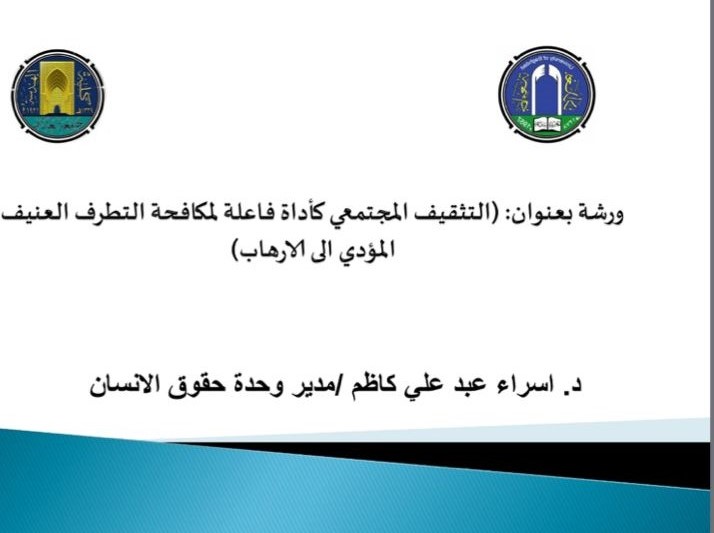Under the patronage of the Dean of the College of Engineering, Professor Dr. Ghassan Hamid Abdul-Majeed, and supervised by the Continuing Education Unit, the Democracy and Human Rights Unit at the college organized an awareness-raising scientific workshop on the evening of Saturday, June 28, 2025, via the Zoom application, titled “Functional Hypocrisy and Its Role in Violent Extremism Leading to Terrorism – A Human Rights and Societal Perspective.”
The workshop was presented by Dr. Israa Abdul Ali Kazem, Director of the Human Rights Unit at the college, and attended by a number of professors and students.
The workshop aimed to enhance human rights and intellectual awareness within the university community and shed light on the link between institutional hypocrisy, job frustration, and lack of justice—and how these factors create a fertile environment for extremism. It also emphasized the importance of building an intellectual environment within universities capable of resisting extremist discourse.
The workshop addressed several human rights and societal themes, including the psychological and social factors influencing youth behavior, the analysis of institutional disaffiliation, and a review of efforts by the Iraqi state and international organizations to combat extremism. It also highlighted the role of university professors and students in promoting a culture of dialogue and moderation.
In linking extremism with scientific disciplines, the workshop presented an intellectual approach to show the impact of the urban environment on identity and belonging. It referenced the experience of the Iraqi architect Muhammad Makiya, founder of the Department of Architecture at the University of Baghdad in 1959, who advocated for the revival of Islamic values in architecture and their role in shaping community spaces that resist intellectual isolation.
The speaker also called for integrating the topic of violent extremism into research and graduation projects in fields such as engineering, law, media, sociology, and architecture, due to the complex nature of the phenomenon that requires interdisciplinary academic collaboration to understand and confront it.
At the conclusion of the workshop, Dr. Israa Abdul Ali emphasized the importance of activating student centers within the university as hubs for constructive dialogue, and enhancing university curricula with critical thinking skills. She also recommended integrating concepts of architecture and urban planning as tools for intellectual prevention, documenting the experiences of those affected by extremism, and organizing regular workshops that combine human rights and engineering perspectives to confront this phenomenon.
This workshop is part of the Human Rights Unit’s strategic plan to integrate human rights awareness and intellectual prevention within the engineering university environment, contributing to sustainable knowledge-based and societal security.







